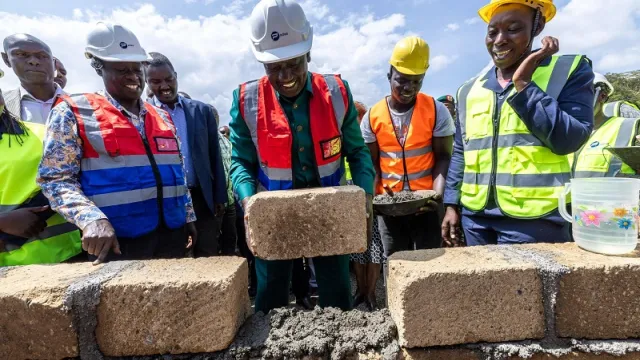Ruto's affordable housing priced at Sh3 million in Nakuru

Ruto's affordable housing priced at Sh3 million in Nakuru
President William Ruto's affordable housing plan is making strides in Nakuru County, offering an opportunity for Kenyans to secure homes at reasonable prices.
For Kes3.13 million, individuals can acquire a two-bedroom unit spanning 64 square meters in the Bondeni area. Additionally, a three-bedroom option with a larger area of 85 square meters is available for Kes4.15 million, an advertisement dated 8th January 2024 states.
To initiate the home purchase, prospective buyers are required to pay a 10 percent deposit upfront, a requirement that low income earners may find it hard to meet.
Subsequently, qualified Kenyans can opt for a rent-to-own home loan, entailing a monthly rate of Ksh16,997 for the two-bedroom house and Ksh22,933 for the three-bedroom house, the ad explained.
"Your applications should be channelled through www.bomayangu.go.ke," part of the advertisement added.
Read also: State gets nod to keep collecting housing levy
Mandatory housing levy
The latest move marks a critical step toward realizing President Ruto's vision of accessible and affordable housing, an agenda that has drawn paise and criticism from a section of Kenyans as the program requires every working person to pay a mandatory housing levy every month.
Early this month, the Court of Appeal directed maintenance of the status quo, implying that workers in Kenya will continue paying 1.5 percent of their monthly income as housing levy until a final decision is issued by the judges on January 28th.
At the moment, government data shows over 300,000 registered applicants in Boma Yangu and more than 30,000 individuals are actively saving for a house. The government's says it now has over 400 affordable housing projects in the pipeline.
Currently, more than 70,000 units are under construction across Kenya, and this initiative is not only contributing to the housing sector but is also a catalyst for job creation with approximately 120,000 youth engaged in various roles.
The eligibility criteria for the allocation of these affordable housing units involve several factors, including the timing of reaching the required deposit amount, family status, and other social considerations.
The allocation process is designed to cater to the diverse demands across various housing categories. Individuals who may not secure an allocation initially are assured a place on a waiting list, ensuring they receive priority consideration in subsequent allocations.



